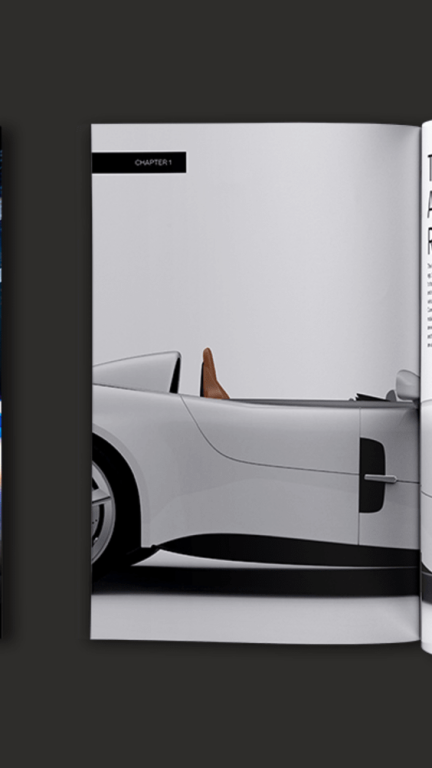DESIGN & COMMUNICATION
TECH & DEVELOPMENT
BUSINESS OPERATIONS
STRATEGY, TALENT & MANAGEMENT
In the new report “Code over Chrome – The future of Automotive”, Nexer presents the transformative shifts, possible future scenarios and key success factors that will be crucial for the automotive industry to consider in the next five to ten years. The report has been developed in collaboration with Kairos Future and industry experts.
The automotive industry is facing one of the most disruptive periods ever, with sustainability, changing consumer behaviour and rapid technological development driving major changes. The role of vehicles in society is evolving from being simple means of transport to becoming part of complex ecosystems that include energy grids, smart cities, and advanced technologies.
“We are in the middle of the third automotive revolution, characterised by new user behaviours, while technology development is faster than ever. It is important to understand the market and changes in demand. The new generations, such as millennials and Generation Z, are demanding more sustainable transport options and sharing opportunities, which means that the value of cars is shifting from being status symbols to serving as practical and flexible means of transport”, says Pierre Renhult, Automotive Industry Partner, Nexer Group.
Five key shifts
The report “Code over Chrome – The future of automotive” highlights five key shifts that automotive stakeholders need to address:
1. Data-driven auto
Vehicles’ on-board sensors increasingly collect real-time data that is processed by advanced software to improve performance, increase safety, and enable features such as autonomous driving. This opens up new opportunities for data-driven business models but also places high demands on security.
2. Sustainable auto
Sustainability is a key component as the industry embraces electric cars and other environmentally friendly options to combat climate change, relieve the energy grid and accelerate the transition to renewable energy sources. No single solution or actor can achieve this transformation on its own; partnerships are needed.
3. Secure auto
Cyber security threats target not only individual vehicles, but also automotive companies and potentially societal structures at large. To meet this growing challenge, the automotive industry needs to actively build and strengthen its expertise in cyber security and risk management.
4. Innovative auto
Software integration and digital innovation are central to meeting the challenges facing the automotive industry. However, transforming car manufacturers into software companies is not primarily a technological change, but a cultural change that requires new competencies and ways of working.
5. Disrupted auto
New customer behaviours, modes of transport, actors and technologies are challenging traditional vehicle manufacturers. The key to success is collaboration and building complex ecosystems that deliver value and meet the changing conditions and needs of consumers and society.
The shifts create a transformation dilemma
Automotive players now face a transformation dilemma where they must decide whether to capitalise on these shifts and embark on a radical transformation to play a central role in shaping the future of mobility.
“The automotive industry is at a pivotal ‘iPhone moment’ where they must shift to a software and data-driven strategy, with a strong focus on utilising the latest technology while ensuring data privacy and security to remain competitive and avoid a similar fate to Nokia,” says Mats Moberg, Strategic Advisor, Moberg Tech.
However, there is a resistance among many automotive players to let go of proven business models and what they do best, i.e. producing cars.
“As vehicles evolve into complex, software-driven machines, the demand for tech talent, ranging from software developers and cyber security experts to AI specialists, is increasing, highlighting a major challenge for the industry. By 2025, the industry is estimated to lack more than 2 million in skilled labour and by 2030, it grows to more than 4 million”, says Pierre Renhult, Automotive Industry Partner, Nexer Group.
About the report
The report “Code over Chrome – The future of Automotive” is produced by Nexer Group in collaboration with Kairos Future. The report is based on surveys, desktop research, and in-depth interviews and workshops with industry experts. The collected material has been analysed and evaluated to map how the automotive industry is expected to develop over the next five to ten years.
About Nexer Group:
Nexer Group is an international tech company with roots in Swedish entrepreneurship and innovation. Nexer has 2,800 experts in 15 countries and is part of Danir Group, a Swedish privately owned company with 12,000 employees in 18 countries. Nexer currently works with some of the world’s largest and most demanding companies, providing expertise in digital transformation, IT, tech, and R&D.
For more information, please contact:
Beatrice Silow, Head of Communication and Culture, Nexer Group
beatrice.silow@nexergroup.com
+46 703 79 15 06
